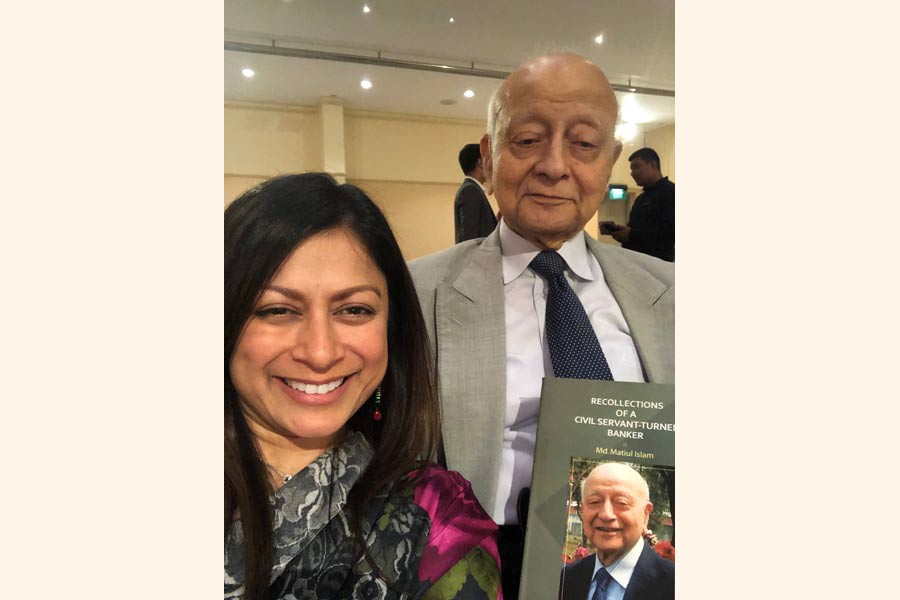Past and present have become inextricably intertwined in a book, authored by Md Matiul Islam, Bangladesh's first finance secretary.
'Recollections Of A Civil Servant-Turned Banker', the 268-page book is basically all about what he saw, heard and did when he was in the thick of things as a bureaucrat, later banker himself.
Apart from civil services in Pakistan and Bangladesh, he also served with the World Bank, UNIDO, and in the private sector of Bangladesh.
After public service career, our civil servants usually do their ritualistic jobs. But Md Matiul Islam moved on to a different trajectory and eventually got involved in the corporate struggles that culminated in the emergence of four separate private institutions, three of which were non-banking financial institutions and a fourth one was a credit rating agency.
The writer spent the last 26 years in creating such private corporate entities. Earlier, he pioneered the establishment of the country's first private commercial bank with Dubai Bank being the majority partner.
The writer, a nonagenarian, is still pre-occupied with the development of the private sector, the engine of Bangladesh's thriving growth in the economic arena.
The book, published by Pathak Shamabesh chronologically captures 41 years of the writer's firm commitment to excellence in active service from both public and private sector perspectives.
By sharing his personal anecdotes and thoughtful insight, Mr Islam brings to life significant historical events in a magnificent way.
Rehman Sobhan, chairman of Centre for Policy Dialogue (CPD), in his foreword, said : Matiul Islam's recollections provide us an object lesson on what should serve as a role model for a public servant…what is no less important in his narrative is the importance of having leaders such as Bangabandhu and Tajuddin who recognise, appreciate and can make the best use of public servants of the calibre of Matiul Islam, who are willing to serve their political masters to the best of their abilities without being obligated to sacrifice their self-respect.
The articles written in a total of eight chapters in the book have already attracted the readers and the second edition is almost ready to hit the market. The first edition was published in December, 2018.
Usually, the first chapter of such a book begins with the writer's childhood. But here, Mr Matiul Islam brought a unique exception by beginning the book with two interviews of him by The Daily Star and The Financial Express.
The titles of the other chapters are : My childhood and career in the civil service of Pakistan and other essays, Role as the first finance secretary under Tajuddin Ahmed, My life-long association with Bangabandhu Sheikh Mujibur Rahman, Post-Mujib era, Contribution to the private sector in Bangladesh, Remembrances and Articles of topical interest.
Readers, specially the new generation readers, will find many intriguing facts in the compelling book, as narrated in a lucid and articulated way by the writer, who still works like a young official in the IIDFC, as its founder chairman.
In one of his childhood (1930-1946) memories, he writes:
"One evening around 1935, we found that the Dhaka skyline was illuminated with fireworks. My mother told us that this was in celebration of the victory of Bhawal Shanyasi in the Privy Council in London…I had the rare privilege of attending a session of the Privy Council in London in 1954 while on a training programme to UK, arranged by the British Council."
The chapter-7 mentioned the writer's memories with Dr Haldor Topsoe --promoter of KAFCO, his mother, his elder brother Md Nurul Islam, also a CSP officer, AZM Obaidullah Khan, Samson H Chowdhury, Amjad Khan Chowdhury and journalist Syed Fahim Munaim.
In the concluding article, titled ' Realities of division of assets between Pakistan and Bangladesh', the writer suggested some important steps which could very well form the basis for negotiating the division of assets between the two countries.
"The pragmatic and practical approach would be that the immovable assets created through foreign project loans and grants in the erstwhile two wings of the country as well as through transfer of resources from one wing to another should automatically belong and vest in the country in which the assets were physically located," the writer commented.
"There is no Gandhiji-like personality in Pakistan to take up Bangladesh's cause, but justice is on our side." (page-268)
Some of the rare photographs of 1960's, 1970's and 1980's enriched the publication, no doubt.
The historic moments of some watershed events covering the economic and political developments which took place more than 55 years back are reflected in the photographs.


